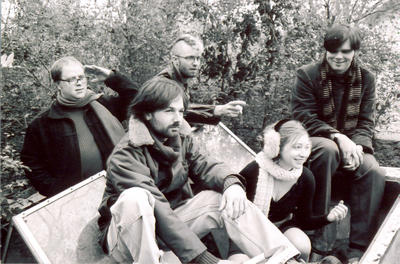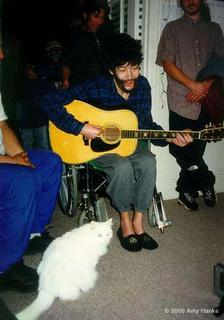
Positive energy and vibrant enthusiasm abound in the new cd-ep by Georgia band Venice is Sinking, a split cd with the band What We Do Is Secret recently released by One Percent Press (www.onepercentpress.com).
Venice Is Sinking is Daniel Lawson on vocals and guitar, Steve Miller on bass, Lucas Jensen on drums, Karolyn Troupe on viola and vocals, and Alex Thibadeaux on keyboards. Their music is infused with crafted songwriting, gorgeous vocals and harmonies, and seamless musicianship. It’s criminal that bands this excellent don’t get much radio exposure, which is significant part aspect of why I produce Seldom Heard Radio in the first place – to play a small role in turning adventurous listeners on to music they may not have otherwise discovered.
I made a conscious decision only to promote and review music, radio stations, zines & other media in this blog that are engaging & that that I enjoy immensely. Lucas and Daniel kindly consented to an interview for this blog, for which I am grateful!
DJ Frederick: Tell me about the song Pulaski Heights and the making of the video that is on your website (I personally found the imagery of the television everywhere very effective)
Daniel: The video was shot and directed by our friends Chris Poules and Tim Hayden of Wow!Bang!Science! Productions. The filming was done over the course of a few days spread out over two weeks. Chris and Tim did the editing in one 24 hour session in an attempt to meet a deadline that we later found out had been extended. Most of the video was shot in and around the Pulaski Heights neighborhood in Athens, Ga. We trespassed on a construction site for the final shots. The cops showed up but kept driving. It was fun. The lyrics to the song are about losing your keys and breaking into your apartment a 4:00 am.
Lucas: I can tell you that I've never changed my drum part once on that song. That was probably the quickest collaboration processes we've ever had. Daniel just brought in that wah-wah-wah thing at the beginning and it seems like the song finished itself. To be fair, the song is the same chords over and over again and my drum part is pretty basic. The title, "Pulaski Heights," refers to the neighborhood in which the band originally practiced, more or less, and I think that all of us have great memories of our times there, drinking mimosas at three in the afternoon and hitting golf balls at trains. But I can't remember who came up with the idea for the TVs in the video. I think Tim and Chris, the directors, came up with that. I thought it was funny. I decided that I would be cutting would with a Skil Saw. That's about it.
DJ Frederick: Tell me a little about the process of collaboration among the band members and is everyone as cool and eccentric sounding as on the website bios?
Lucas: Well, I would say that none of us is very cool, except maybe Steve. Eccentric maybe. I like a lot of George Michael/Wham records. Is that eccentric? It's surely not cool. As you can probably guess, those bios are a little, um, embellished.
As far as collaboration goes, it works like this: first we consecrate the blood of seven Melanesian virgins. Then we call on Az'grodnok, He of the Third Phase of the Destructors.
I kid, I kid. Actually, collaboration for us is a pretty easy process. Usually Daniel brings in the bare-bones idea for a song: riffs, melodies,keyboard hooks, and the like. Then we sort of jam our way through it and Karolyn and Daniel work out the harmonies and lyrics and stuff. Lyrics are usually the last thing added. Steve's pretty good at figuring out amazing bass parts at the beginning. It's actually not that long of a process for us...it's just getting around to doing it at practice. It's never been contentious.
Daniel: When we first started we weren’t really a band at all. We started out just meeting at a friend’s house at 666 Pulaski Street and improvising. We were much more experimental back then. Eventually, I started bringing in pop songs I had been working on and it went from there. Everyone added their own parts and everything got much more structured. Nowadays, we write songs as a band which is nice. It’s actually a lot like when we first started.
DJ Frederick: How are you promoting your music and how successful has that been?
Daniel: We try to play out of town as much as possible and so far the response has been pretty good. We put songs on the internet for people to hear and things like that. Once our record comes out in March we plan on doing a lot more in the promotion department.
Lucas: We haven't really started promoting stuff beyond small tours and some local and internet press, but we are planning a big campaign starting soon that will last through March, when our full-length is slated to come out. I am a publicist, so that's handy. Hopefully we will find some success.
DJ Frederick: What are your feelings on the state of radio in the US?
Daniel: The only radio I listen to anymore is NPR and certain shows on AM radio. Sometimes I listen to the local college radio station which can be great and sometimes can be annoying. The rest of the dial is pretty bleak though. I think satellite radio is amazing and overwhelming at the same time.I think podcasting is pretty interesting though I really don’t know much about it.
Lucas: Radio in the US? What kind of radio? I like the top 40 stations, to be honest, because they don't claim to be anything else than what they are. I don't want to hear Creed on classic rock radio and Dave FM...well that's just a stupid name. There are exciting new developments in the world of podcasting, the Jack format, and more, but I think that people forget that college radio, however amateur, has been educating and providing great radio in most markets in America for quite some time. I'm a major college radio devotee. Actually, I listen to a lot of AM radio, and, let me tell you, it's as crazy as ever.
DJ Frederick: What is your band doing in the upcoming few months for gigs, recording, etc?
Lucas: We're hoping to record some new songs for an EP. I have this idea about creating new songs completely out of loops, like the band Menomena. We have a bunch of out-of-town gigs coming up, so there's that. And of course the eventual release of our first LP, tentatively titled Pig Manure Mash Up.
Daniel: We’re taking off for most of December to work on new songs for our next release and to start promoting our full length record which should be out in March. We can’t wait to start recording again, it’s been way too long since we’ve been in the studio.
Editors note: Venice Is Sinking have a visually stunning website with sound samples, the video for Pulaski Heights, band bios & more at www.veniceissinking.net.
